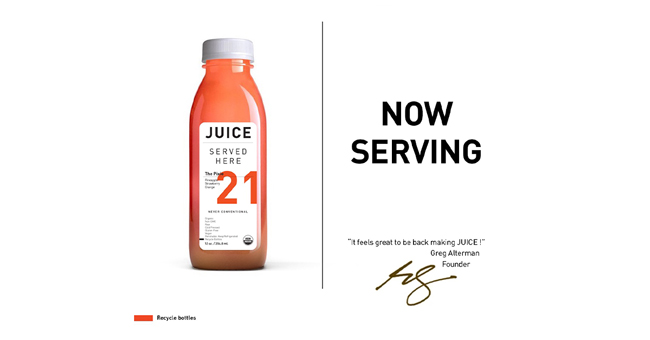After a period of fits and starts, Juice Served Here (JSH) is finally ready to live up to its name.
If that sounds familiar, you’re not wrong. The California-based cold pressed juice company, which at one point encompassed a manufacturing plant and a chain of retail juice bars, closed its doors in late 2017. Just a few months later, co-founder Greg Alterman posted a cryptic message (“We will meet again”) teasing JSH’s comeback on the brand’s Instagram page, and, after reacquiring the intellectual property rights, told BevNET in 2019 he planned to revive JSH as a wholesale-focused operation that fall, only to be slowed by headwinds from COVID.
But after nearly four years in limbo, JSH has officially returned, rolling out to around 40 coffee shops and specialty cafes across San Diego and Los Angeles with distribution through Seacoast. “It feels great to be back making JUICE!,” Alterman announced in a post in October. Or rather, as he said on a phone call last month, the brand is back to “doing what we do best.”
“Our goal is to make great juice,” he said. “I think we really want to take our time, get out of the gate and start exceeding the customer’s expectations again. We are really concentrating on having the best recipes and best juices again.”
At its peak, JSH’s wide range of cold-pressed HPP juices were sold at 7,000 locations, including 13 of its own retail juice bars across the Los Angeles area. Yet spiraling costs — including operating its own 25,000 square foot manufacturing facility to produce 28 juice SKUs — and expansion overreach ultimately caught up with the company, and by late 2017 its funding had dried up after investors declined to inject more last-minute capital. Reflecting on the situation now, Alterman admitted that investment buzz around brands like Suja and Pressed at the time influenced JSH’s direction, pushing it towards driving top-line revenue rather than building long-term fundamentals.
“When we were making our own juices, we were less efficient in our own manufacturing and keeping our costs in line with the fluctuations of the pricing of fruits and vegetables and the seasonality and those types of things that we didn’t quite understand before as manufacturers,” he said.
On the second time around, Alterman plans to keep things simple. The company is using a co-packer to manufacture its portfolio of drinks in 12 oz. bottles, now slimmed down to just three juice SKUs — Field of Greens, Pipecleaner and Pixie — and five flavors of lemonade, including Ginger, Strawberry, Aloe and a variety named “Bluey.” The juices will retail for $6.95 to $7.95 per bottle, and the lemonades will range from $5.95 to $6.95 each. Aside from some minor tweaks in font size, JSH’s bottles and design will look instantly recognizable to customers familiar with the brand. That’s a deliberate choice, as Alterman is banking on JSH’s longtime fans and former retail partners (Whole Foods and Sprouts, among others) to find their way back.
“I still think when you see our product on the shelf that it pops, and I’m hopeful that people will remember the experiences that they did have certainly in Southern California with the brand and the touch points and it’ll still resonate with them,” he said.
At the same time, Alterman acknowledged that premium juice isn’t the same category that it was back in 2017. Beverage conglomerates PepsiCo and Coca-Cola have largely surrendered their positions in the space, while national brands like Bolthouse Farms and Suja have been sold off to private equity groups.
“We’re coming in humble,” Alterman said. “We’re not thinking we’re lighting the world on fire with anything, we have to prove ourselves again and that’s just the general attitude that we are going to take — that we are going to exceed expectations and deliver a top-notch product that’s priced right.”
